Updated: February 2, 2026
Buying property in Portugal for foreigners is a relatively simple process without any nationality restrictions. You will need a Portuguese tax number (NIF) to proceed with your purchase. Once you’ve made your choice of the property you wish to buy, you will sign a promissory contract and later seal the deal with a final deed of sale. Along the way, you will do thorough due diligence, legal checks, and register your property with the Land Registry Office (Conservatória do Registo Predial).
The Portuguese property market is an excellent financial investment. Property values have been consistently rising, with average property prices ranging from around €1,900 in the north to close to €7,000 per square meter in prime Lisbon locations, with Lisbon having the highest prices. Foreign investors are particularly drawn to the climate, natural landscape, and high standard of living.
If you are looking to acquire property in Portugal, this step-by-step guide has everything you need for a successful purchase in 2026. It will answer any questions you might have about the legal requirements, where to buy, due diligence, and taxes.
Stick around to read about:
Key Aspects of Buying Property in Portugal
- There are no restrictions on foreign buyers purchasing property in Portugal
- Property prices range depending on location, from €1,903 (Northern Portugal) to €9,051 (Santa António neighborhood in Lisbon)
- Prices vary widely depending on location, with Lisbon the most expensive city
- The Portuguese property market offers various investment options, with strong rental yields (Lisbon Metropolitan Area: 6.8 percent)
- International buyers are drawn by the low cost of living, high quality of life, and attainable residency options
- Property purchase tax generally ranges from 0 to 8 percent, depending on location, property type, and intended use
Why buy property in Portugal?
Portugal’s real estate investment market attracts both domestic and international buyers. Cities with the highest rates of foreign property ownership include Lisbon, Porto, Faro, and Cascais. But why are so many now buying property in Portugal?
Top reasons to purchase real estate in Portugal
There are countless reasons foreigners buy property in Portugal. You’ll be purchasing property in a dynamic, growing market with excellent potential for returns while enjoying a low cost of living that remains affordable in 2026 when compared to much of Western Europe.
The infrastructure is robust, offering world-class education and healthcare, and the country is ranked the seventh safest in the world by the 2025 Global Peace Index, with strong political stability. There are more than 50 international schools in Portugal, making the country a favorite amongst families seeking a better quality of life.
Many Portuguese speak English, with Portugal ranking sixth on the Global English Proficiency Index and making it easy for foreigners and property investors to integrate. Add in the incredible gastronomy (with Lisbon crowned Europe’s best culinary city in 2024), many cultural and recreational activities, world-class surfing and golfing, festivals all year round, and the fact that there are no restrictions on foreign property ownership, and it’s easy to see why so many are making Portugal their home.
Can foreigners buy property in Portugal?
Yes, foreigners can buy property in Portugal and have the same ownership rights as local buyers. The Portuguese property market is open and accessible to international buyers, with no restrictions on owning property in Portugal. The process of buying property is transparent and largely straightforward, although you will need to navigate the necessary legal and financial steps.
Three essential steps for foreign buyers
These steps are crucial for a streamlined buying process, from property search to making the final offer.
- Obtain a Portuguese Tax Number (NIF): You’ll need a Portuguese tax identification number (Número de Identificação Fiscal), which is the first step to purchasing a home in Portugal. This number is needed for all fiscal activity in Portugal, including buying property, opening a bank account, or setting up utilities. For non-EU nationals, you will need a fiscal representative to apply for your NIF.
- Open a Portuguese bank account: While not mandatory, we highly recommend opening a bank account in Portugal to save on international transfer fees and make it easier to facilitate tax payments, deposits, and transferring funds for a smoother process.
- Hire a lawyer and a buyer’s agent: An experienced real estate lawyer is crucial for due diligence, contract checks, and verifying the seller and property, ensuring there are no outstanding debts. A buyer’s agent will represent only you, the buyer, making sure your interests are protected throughout the buying process.
Portuguese Real Estate Market Overview
In 2026, the Portuguese real estate market looks set to continue to attract international buyers, driven by strong demand, market resilience, and consistent growth.
Portugal’s economic growth is promising, with Gross Domestic Product (GDP) predicted to rise by 2.2 percent in 2026 and 2.1 percent in 2027, according to the European Commission.
Investing in Portugal’s property market continues to be advantageous due to increasing rental yields, dipping mortgage rates, and the country’s overall appeal to property buyers and international visitors.
The property market has a variety of options, from affordable country homes to luxury villas, commercial properties, and individual apartment units. Portugal is known for its relatively low cost of living compared to many Western European countries, including the US, making owning property in Portugal more accessible.
Average property prices in Portugal
The property prices shown below provide an overview of the Portuguese property market in the Lisbon and Porto areas, plus Faro, the capital of the Algarve. Property prices will vary depending on the type of property and location. If you choose to buy outside the city center or further from the coast, you will find that property prices are lower.
City | Lisbon City | Cascais | Oeiras | Porto City | Matosinhos | Vila Nova de Gaia | Faro |
Property price in 2024 (€/m2) | €6,934 | €7,260 | €5,245 | €4,883 | €3,884 | €3,759 | €3,701 |
Source: Confidencial Imobiliário (Portuguese property databank)
Which areas are the most expensive to buy property in Portugal?
The most expensive regions for property acquisition in Portugal are Lisbon and parts of the Algarve. Setúbal, located close to the Portuguese capital, can also be a high-priced location for property, as can luxury houses in Comporta, Cascais, Melides, and Troia on the Southwest coast.
Similarly, in the Algarve, buying property in cities like Loulé and Lagoa, you can expect to find relatively expensive properties. When it comes to luxury residences and apartments, Vale do Lobo, Quinta do Lago, and Vilamoura emerge as the top choices in the Algarve.
What is the cheapest place to buy property in Portugal?
So, how much is a house in Portugal? This depends hugely on location. For cheap properties and top bargains, you should head to the interior parts of the country. The north of Portugal and the central region of Portugal are amongst the most affordable areas, with average asking prices standing at €1,903 and €2,098, respectively. In the Alentejo, you’ll also find stunning properties at very reasonable Portugal house prices. The average asking price stands at €3,181, with some areas being much cheaper than others.
Where to buy property in Portugal?
Portugal offers a range of beautiful locations for expats and foreign investors seeking to buy Portuguese property. The perfect spot for you will depend on your budget, lifestyle, and your property investment goals.
To find the right property, determine which type of lifestyle in Portugal you prefer, or what your investment goals are. Each region and city will have its own unique charm and perks. Take the time to ensure you get to know the country and the diverse range of locations on offer.
Here are some of the best places to consider in the property market.
Lisbon
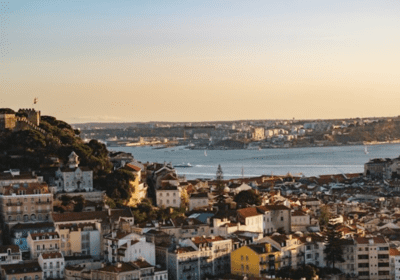 Lisbon, the Portuguese capital, perfectly blends innovation and tradition. This city has a high property value, attracting the highest number of foreign owners, especially for commercial investments and property rentals.
Lisbon, the Portuguese capital, perfectly blends innovation and tradition. This city has a high property value, attracting the highest number of foreign owners, especially for commercial investments and property rentals.
You can buy property in Lisbon across different neighborhoods, like Baixa, a popular shopping district with buzzing nightlife. Families should consider Estrela, with its wide open parks, ideal for spending time outdoors. You also have Parque das Naçōes, with its futuristic cable cars, top-quality restaurants spilling out on the street, and fabulous views of the River Tejo.
Algarve
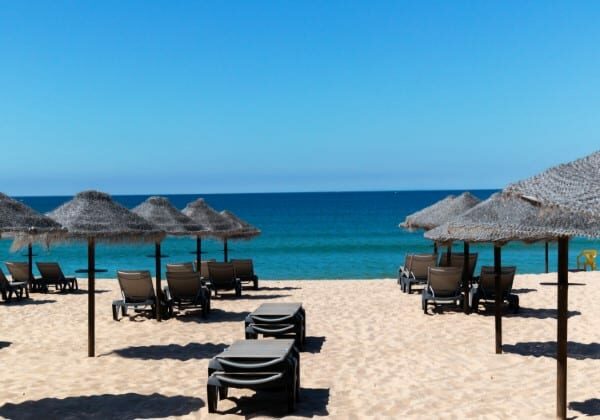 Foreigners buy property in the Algarve due to its beautiful coastline, stunning beaches, and warm climate. It has a high potential for property investment for those seeking better property prices to earn a good rental income, especially in the peak tourism season. The coastal area comes alive in summer, with a property value constantly increasing.
Foreigners buy property in the Algarve due to its beautiful coastline, stunning beaches, and warm climate. It has a high potential for property investment for those seeking better property prices to earn a good rental income, especially in the peak tourism season. The coastal area comes alive in summer, with a property value constantly increasing.
Cities like Faro, Albufeira, and Lagos are particularly popular among property buyers, especially for foreign property ownership. Regions like Monchique and Alcoutim offer affordable properties, with average property prices of €2,381 and €1,780, respectively.
Porto
 The second-biggest Portuguese city has evolved quite drastically over the years, attracting visitors with its charming narrow streets, fabulous riverside restaurants, cafes, and boutique stores.
The second-biggest Portuguese city has evolved quite drastically over the years, attracting visitors with its charming narrow streets, fabulous riverside restaurants, cafes, and boutique stores.
Buying property in Porto, Portugal, is a great option for investors whose financial position allows them to tap into the real estate market. Porto is cheaper than the capital, with accessible interest rates. But property prices are high and keep increasing, especially near the coast.
If you are looking for stunning beaches, you’ll find many nearby Porto and various activities, such as surfing, yoga, or cooking classes. Both local and foreign investors will find property rental an attractive option, with many students, remote workers, and young professionals creating demand for this type of accommodation in the city, leading to high rental yields.
Cascais
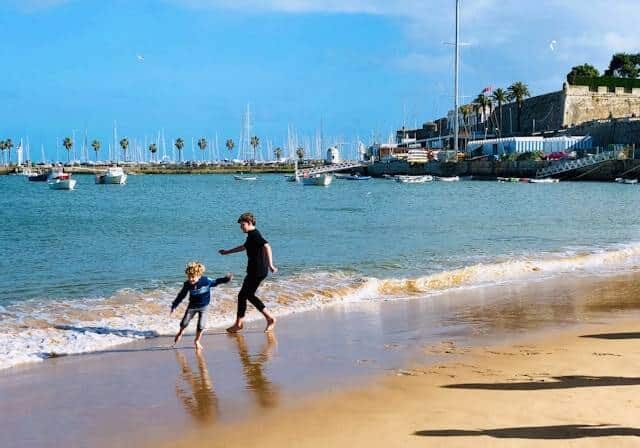 Buying Property in Cascais remains a popular choice for many foreigners and domestic investors. The property market in Cascais has increasing property values, with an average property price of €7,260 per square meter, with some regions reaching well over €8,546.
Buying Property in Cascais remains a popular choice for many foreigners and domestic investors. The property market in Cascais has increasing property values, with an average property price of €7,260 per square meter, with some regions reaching well over €8,546.
Foreigners buy property in Cascais and neighboring Estoril for the high rental income, luxury properties, and excellent location. This coastal town is, after all, a short drive away from the Portuguese capital and the beautiful town and Natural Park in Sintra. Oeiras is another attractive option on the Portuguese Riviera, even closer to Lisbon.
The Silver Coast
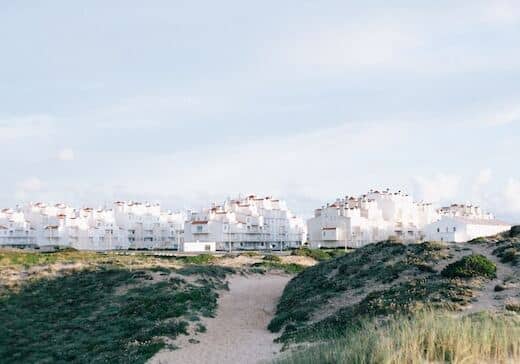 The Silver Coast in Portugal is a captivating region renowned for its pristine beaches, historic towns, and vibrant culture. Situated on the Western Coast between Lisbon and Porto, it is characterized by rugged cliffs, golden sands, and charming fishing villages.
The Silver Coast in Portugal is a captivating region renowned for its pristine beaches, historic towns, and vibrant culture. Situated on the Western Coast between Lisbon and Porto, it is characterized by rugged cliffs, golden sands, and charming fishing villages.
Foreigners buy property on the Silver Coast, often in Nazaré, which has a thriving property market due to its surfing waves and rugged coastline.
Other locations
Other locations where you can invest in Portuguese property include the Alentejo, with its green rolling hills, Comporta and Melides, for luxury properties in the heart of nature, the autonomous islands of Madeira, and the Azores—all offering good property values.
Location | Average price | Lifestyle | Best for investment and rental demand | Best value for spacious properties |
Lisbon | Lisbon City: €6,934; Lisbon Greater Area: €4,935 | Cosmopolitan capital city living, blending innovtion with tradition | Very high: Highest number of foreign owners; strong year-round demand | Lower: High density and high property values; focuses more on prime location, although you can still find larger properties in certain neighborhoods and outside the city center |
Porto | Porto City: €6,934; Porto Greater Area: €4,883 | Portugal's charming second largest city, with meandering streets and welcomeing locals. | High yields: High demand from students, remote workers, tourists,and young professionals | Moderate: Cheaper than the capital with accessible interest rates, but prices are increasing |
Algarve | €4,385 (very location dependent, prices vary across the region) | Coastal living, with beaches, high quality of life, and a mild climate | Seasonal peaks: High potential for rental income, especially in the peak summer season | Varies by area: Coastal areas are high-value; Interior areas (like Monchique) offer more space |
Cascais | €7,260 | Luxury coastal living close to Lisbon | Luxury demand: High rental income, with steady rental yields | Premium: High price per square meter; focuses on luxury and exclusive location |
Silver Coast | €1,109 (Cantanhede) to €3,657 (Óbidos) | More affordable coastal real estate with authenticity, dramatic scenery, quieter beaches, and quaint towns | Growing: Developing market, particularly in famous surf-centric regions, such as Nazaré and Ericeira | High: Offers good value for coastal property compared to the Algarve and Cascais. |
Alentejo & Interior | Alentejo: €3,181 Center: €2,098 North: €1,903 | Portuguese countryside with a slower pace of life and beautiful nature | Steady: Growing interest for rural tourism and remote living, set to step into the spotlight in 2026 | Excellent: Best for those seeking affordable, spacious properties and land |
Comporta & Melides | Melides: €10,147 | Secluded high end retreats by the coast | Exclusive: High interest for luxury rentals in the heart of nature. | Premium: Offers intricate villas working with nature and Alentejan architecture, but at a high luxury price point; size of properties depends |
Madeira & the Azores | Madeira: €3,760; Azores (São Miguel Island): €2,270 | Island living with unique natural landscpaes | Steady: Popular for vacation rentals and secondary homes. | High: Offers good property values and unique natural surroundings |
Types of Property in Portugal
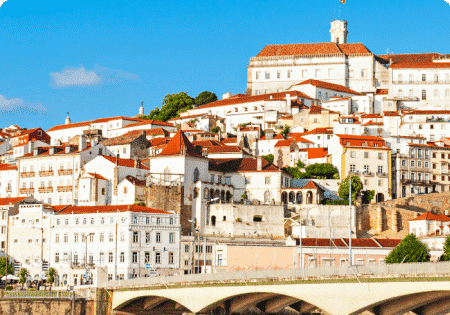 As Portugal’s property market continues to thrive and grow year-on-year, you’ll find a wide range of properties across the country to suit various preferences and budgets.
As Portugal’s property market continues to thrive and grow year-on-year, you’ll find a wide range of properties across the country to suit various preferences and budgets.
- A casa or moradia is a typical detached home, with many having their own patio or backyard.
- A casa geminada is a semi-detached house.
- Condomínios (or condos for short) is an individual apartment unit with common spaces. Usually, owners will need to pay a monthly condo fee and, in return, will secure a premium standard of care. Many condos will come with gyms, swimming pools, and other amenities, and are particularly common in the Algarve.
- Quintas are rustic houses or farms, and you’ll even find many luxury quintas in Portugal that provide more exclusive amenities. Quintas are usually found in the countryside, although you can also find a few in the suburban areas of cities.
- Terreno translates to land in Portugal, and many foreign buyers opt to snap up land to build their dream home from scratch. If you venture down this route, it is a good idea to check with the city hall (Câmara Municipal) to double-check that the land is registered for residential use as opposed to land used for agricultural purposes.
Below you can find the most common locations for the different property types in Portugal.
Property type | Description | Typical locations |
Urban apartments | Renovated or modern apartments, ideal for city living or investment | Lisbon, Porto, Braga, Coimbra, cities |
Coastal villas | Luxury, spacious properties, often with ocean views | The Algarve, Silver Coast, Comporta |
Rural and traditional properties | Country homes, farms, quintas, vineyards, and land for sale | Alentejo, Central Portugal, North Portugal |
New developments | Modern apartments or properties, often in up-and coming areas | Lisbon and Porto suburbs, increasingly popular coastal zones |
Apartment terminology in Portugal
When searching for an apartment in Portugal, you will come across terms such as T0, T1, T2, T3, etc. This basically indicates the number of rooms the property has. For example, a studio apartment would be referred to as a T0, a one-bedroom apartment would be referred to as a T1, and a three-bedroom apartment would be a T3.
What is the cost of owning property in Portugal?
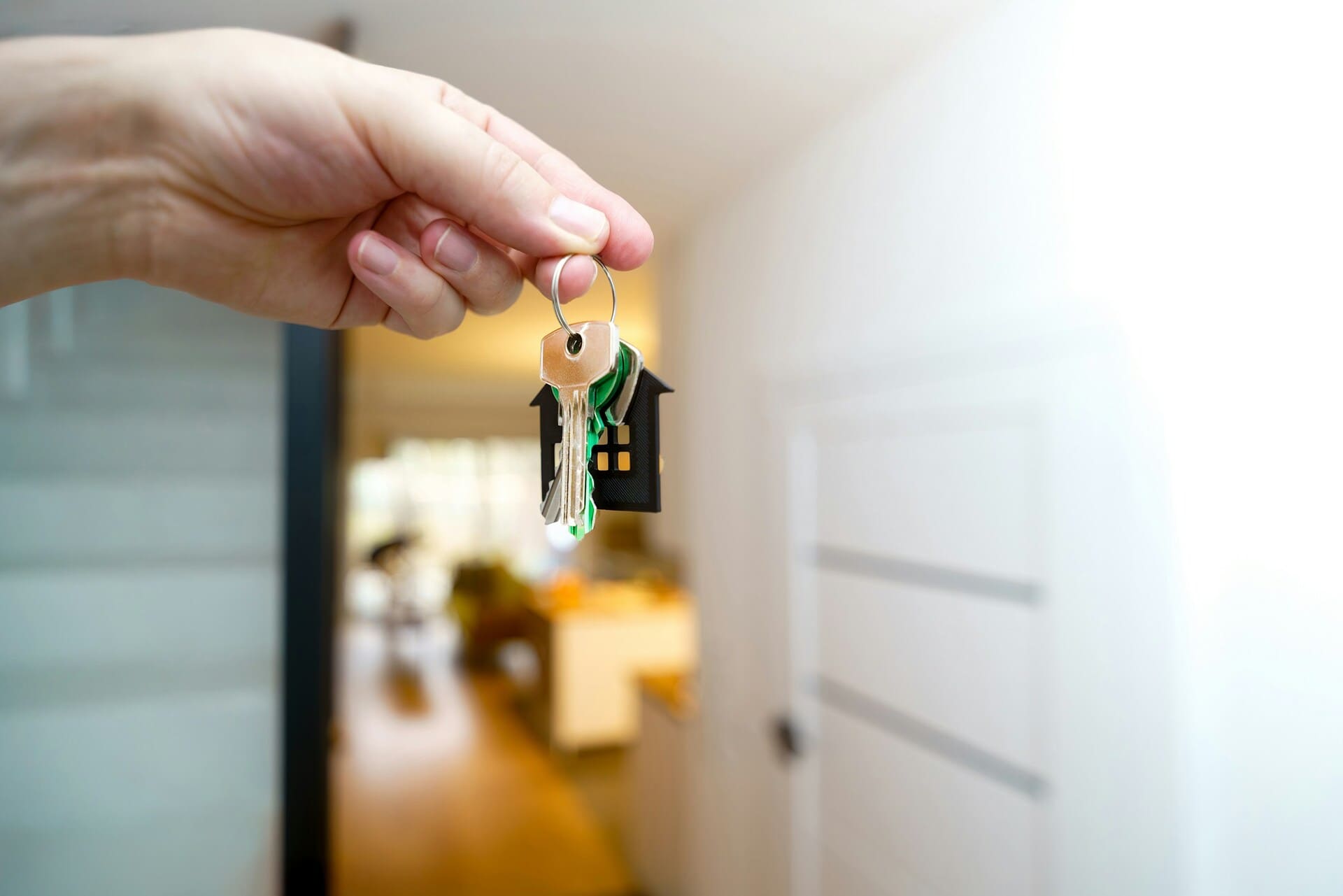 In addition to the payment for the property and the associated fees, you should factor in hidden costs and ownership costs.
In addition to the payment for the property and the associated fees, you should factor in hidden costs and ownership costs.
- Legal fees: A lawyer will cost you approximately €2,000-€5,000, depending on the type of property, the price, and the complexities of the purchase. A legal professional can charge between 1 and 1.5 percent of the purchase price, plus VAT (Value Added Tax).
- Registration fees: The property is registered in your name with the Land Registry. There is a public fee for the Land Registry, amounting to €250.
- Notary Fees: Notary fees will cost you around €500-€1,000.
- Utility costs: You will need to set up utilities such as water, electricity, and internet.
- Maintenance costs: Factor in maintenance costs, if applicable.
- Taxes at time of purchase: IMT (Property Transfer Tax) and Stamp Duty (Imposto de Selo), which come at varying rates at the time of purchase (see tax section below).
- Ongoing taxes: IMI (Imposto Municipal sobre Imóveis) and AIMI (Additional to IMI on properties valued at over €600,000)
Required Documents to Buy Property in Portugal
 The documents you need to buy a house in Portugal, or any kind of property, include:
The documents you need to buy a house in Portugal, or any kind of property, include:
- NIF number: Tax identification number
- Photo ID: A valid identification document that verifies your identity. This can be a passport or Portuguese ID card (Cartão de Cidadão)
- Contrato Promessa de Compra e Venda (CPCV) or Promissory Agreement: The buying contract or property deed that outlines the terms and conditions of the property purchase.
- Portugal Energy Certificate: This document provides information about the energy efficiency of the property and must be presented to you by the seller.
- Imposto de Selo: The stamp duty payment, which is a tax required by the Tax Authority for property transactions.
- Caderneta Predial: The purchase and sale of property needs to be registered with the land registry. This certificate contains information about the property, including its location, boundaries, and registered owner. The land registry certificate serves as evidence of the legal status of a property as of the date of issuance. The land registry certificate compiles and describes the current registrations applicable to that property.
While it is not mandatory to have a real estate lawyer in Portugal, it is highly recommended that you seek legal assistance when buying property, given the process’s complexities, and ensure that everything runs smoothly. A legal professional can collect the necessary documents, do thorough due diligence on the condition of your property, perform title checks, and look for any hidden issues.
Due diligence checklist
Your lawyer should verify the following as part of their due diligence:
- Land registry: Verify that the seller’s ownership of property, ensure the title is correct, and that there are no title or lien charges, outstanding mortgages, legal restrictions, or property boundary issues.
- Caderneta Predial vs reality match: To make sure the property is described correctly in the Caderneta Predial, which is essentially the property’s identification card.
- Licença de Utilização: The license of use that you will need to get from the local municipality. This proves it’s legally fit to live in. For older homes, consider getting a survey before making a purchase.
- Energy certificate: To make sure this is given to you by the seller.
- Condominium fees: Make sure there are no outstanding condominium fees, if applicable.
- Urban planning compliance: Ensure you can make extensions or build on the land, if applicable to you or you wish to do so in the future.
- Alojamento Local (AL) license restrictions: If you are buying to rent your property out in the short term, you will need an Alojamento Local (AL) license. Your lawyer will be able to ensure there are no restrictions on the location you wish to buy your property.
Getting a NIF number
To purchase property in Portugal, whether you are a resident or non-resident, you will need to have a Portuguese tax number (NIF). This is a tax number that is crucial for financial transactions in Portugal, including buying property in Portugal, opening a bank account, or making financial transactions in Portugal. You can get your NIF at your local tax office (Finanças) or remotely.
It’s advisable to open a bank account to avoid fluctuations in exchange rates that could cost you financially.
Our residency and citizenship division, Global Citizen Solutions, for example, can get a NIF (and set up a Portuguese bank account) for you remotely, without you having to go to your local tax office.
Step-by-Step: How to Buy Property in Portugal
Here is a quick look at the buying process.
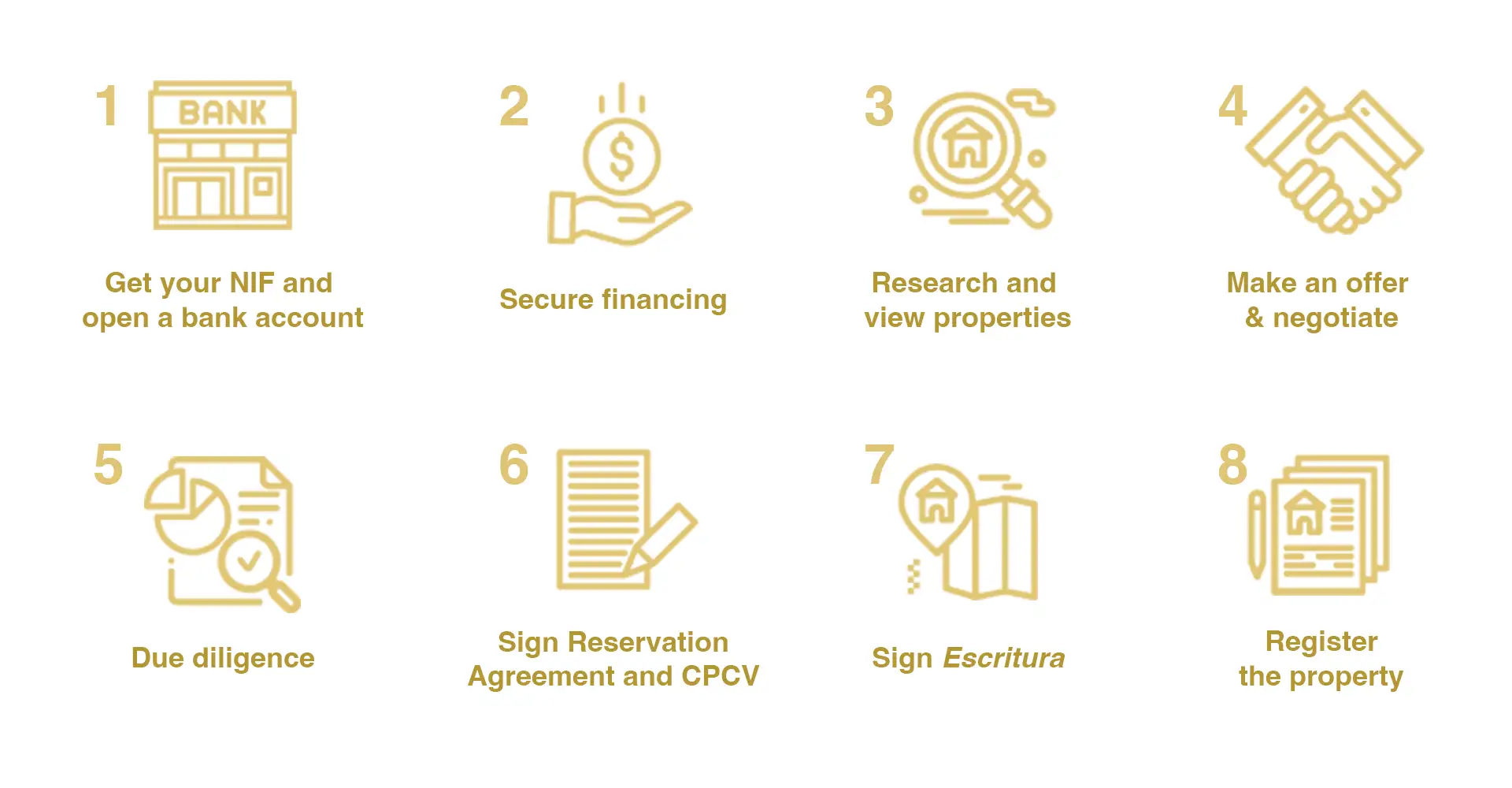
- Step 1: Get your NIF and open a bank account: Get your NIF, required for all fiscal activities. Also, open a bank account to save on overseas transactions.
- Step 2: Secure financing: You will need to demonstrate that you have the financial means to purchase the property, whether through savings, a mortgage agreement, or other investments. Assess your finances and work out whether you want to take out a mortgage and what plan works for you, while also making sure you understand the associated property costs, such as property taxes. It’s best to explore mortgages as soon as possible to determine how much you can borrow and what types of properties you should be targeting.
- Step 3: Research and view properties: Set a budget, research property prices, and consider location, amenities, and rental potential. Commit to research and planning, and schedule property viewings to assess shortlisted properties and surrounding areas. If the house is not move-in ready, you’ll need to factor in renovation costs.
- Step 4: Make an offer & negotiate: Talk with the seller about the property value based on the current property market, and try to reach a mutual agreement.
- Step 5: Due diligence: When you have agreed on the price, your lawyer will be able to conduct due diligence on the property and the seller.
- Step 6: Sign the Reservation Agreement and Promissory Contract (CPCV): The Reservation Agreement shows your intent to buy and take the property off the market, with a reservation fee to be paid. Following this, the CPCV, a preliminary agreement outlining the terms of the sale, will be signed. This will typically include a deposit of 10 to 20 percent of the purchase price. This may be non-refundable if the buyer withdraws from the sale.
- Step 7: Sign the Escritura (Final Deed): Sign the Final Deed in front of a Notary, pay the remaining balance and fees, and officially become a property owner in Portugal. You will need to have paid the IMT (transfer tax) and Stamp Duty.
- Step 8: Register the property. Visit the Land Registry Office (Conservatória do Registo Predial) and get legal ownership to protect your property rights.
If you can’t find a mortgage provider or have trouble compiling all the necessary documents, consult with experts. A buyer’s agent and a real estate agent can guide you through securing your Portuguese property.
What are the pitfalls of buying property in Portugal?
While the process to buy property in Portugal is largely straightforward, it is best to be aware of potential pitfalls that can trip you up.
- Hidden property issues and unregistered debts or liens: Structural issues and undisclosed debts, liens, or taxes attached to the property. Having a good buyer’s agent or real estate agent and an experienced lawyer by your side is essential.
- Legal complexities: Navigating local laws can lead to costly mistakes further down the line
- Market fluctuations: Although Portugal’s property market is generally stable, economic shifts can still impact property values, as in any other country.
- Cultural and language barriers: Particularly if you don’t speak Portuguese or are unfamiliar with the market, misunderstandings can arise, slowing down your buying process or causing avoidable issues.
Running into pitfalls is common when navigating the property market. Researching evolving market conditions, conducting complete due diligence, and working with experienced professionals will ensure a sound and secure property purchase.
Financing a Property in Portugal
Buying a home in Portugal has flexible financing options to suit different needs. Many buyers choose to get a mortgage loan from a Portuguese bank, which is available to both residents and non-residents.
- Non-residents typically face a lower Loan-to-Value (LTV) ratio, with the maximum amount that they can borrow being around 60-80 percent of the property value, and may be subject to slightly higher interest rates on shorter loan terms.
- Residents can usually get a mortgage with an 80-90 percent LTV.
We suggest you open a Portuguese bank account at one of the country’s top commercial retail banks, such as the Millennium BCP, Caixa Geral de Depósitos, or Banco Santander Totta.
Before approving a loan, Portuguese banks typically require proof of income, a credit report, and a property evaluation. Portuguese banks can ask for additional documents, such as an employment letter of confirmation, income tax returns, notice of settlement, etc. With the right approach, you can finance your dream home in Portugal.
Property Taxes in Portugal
When buying properties in Portugal, you must be aware of your tax obligations, which you must pay at the time of purchase and on an annual basis.
When Paid | Tax/fee | Cost | Description |
One time tax at time of purchase | IMT | Usually 0-8%; 10% for blacklisted jurisdictions | Progressive property transfer tax based on price, location, type, and intended use. 10% for buyers linked to blacklisted jurisdictions. |
One time tax at time of purchase | Stamp duty | 0.8% | Standard tax applied to all property transactions; paid on the purchase price. |
At time of purchase | Lawyer; Notary; Land Registration | 1.5%–2.5% | Covers due diligence, contracts, deed signing, and registration. |
Annual basis | IMI | 0.3%–0.45% (urban), sometime reaching 0.5% 0.8% (rustic) | Annual municipal tax based on VPT (taxable property value). |
Annual basis | AIMA | 0.7%–1.5% | Applies to properties with VPT above €600,000 (€1.2M for couples). |
To find out more, check out the article on Property Taxes in Portugal.
Portugal Buying Property Versus Renting Property
Both renting and buying property in Portugal have something unique to offer.
- Why buying is better: Buying gives you long-term stability and builds equity; however, it comes with high upfront costs and a higher financial commitment.
- Why renting is better: Renting gives you more flexibility and fewer responsibilities when it comes to maintenance, but you don’t gain ownership of the property.
Whether you opt to buy or rent will depend completely on your priorities at the moment. You should pick the option that suits your lifestyle, budget, and long-term goals.
Where to look when buying property in Portugal?
To find the right property in Portugal, feel free to check our guide Zillow Portugal, which includes a list of all the best websites for finding your dream home.
When buying property in Portugal as a foreigner, it’s best to consult a real estate agent or a buyer’s agent. A property finder in Portugal can give you full access to the property market and guide you through the entire process of buying a home.
Together, you can find the ideal property prices that match your budget, and get a realistic perspective on the pros and cons of buying property in Portugal. You can navigate the pitfalls with the right legal documents when purchasing property.
Make sure that the real estate agent or buyer’s agent you choose is licensed. The most credible license is the AMI License, issued by IMPIC. This license is required for property agents to conduct real estate mediation activity. You can find out more about it on the Portuguese government website.
Exploring Visa and Immigration Options for Portugal
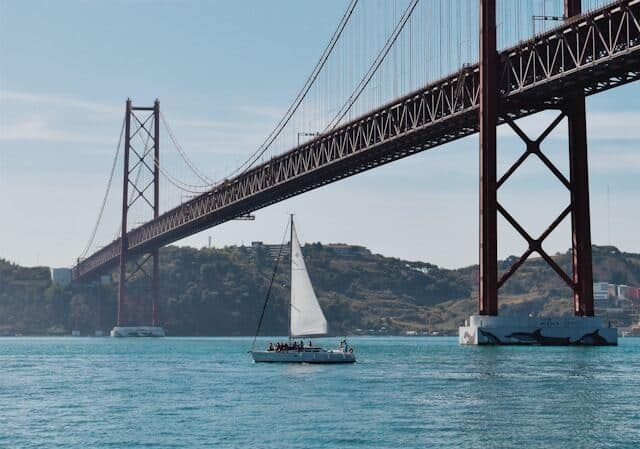 Owning property in Portugal does not grant you Portuguese residency. If you wish to live in Portugal on a permanent basis, you will ned to secure residency through a visa, such as the D7 Visa (for retirement, passive income), D8 (Digital Nomad Visa), or Golden Visa (for investors). Property ownership will strengthen certain visa applications, as it is required to show proof of accommodation as part of the application.
Owning property in Portugal does not grant you Portuguese residency. If you wish to live in Portugal on a permanent basis, you will ned to secure residency through a visa, such as the D7 Visa (for retirement, passive income), D8 (Digital Nomad Visa), or Golden Visa (for investors). Property ownership will strengthen certain visa applications, as it is required to show proof of accommodation as part of the application.
For individuals contemplating relocating to Portugal, it’s crucial to thoroughly understand the diverse visa and residency alternatives. While it is relatively straightforward for EU citizens to relocate to Portugal, non-EU citizens must jump through some more hoops.
The Portugal Golden Visa, launched in the wake of the financial crisis, stands out as an appealing choice for many. It provides residency opportunities for foreign investors and their families. The short stay requirement of the Portugal Golden Visa is one of the key benefits of the program. Those contemplating retirement in this picturesque nation can explore the Retirement Visa (D7 Visa), specifically designed to cater to their needs.
Digital nomads can choose from short- and long-stay options through the Digital Nomad Visa (D8 Visa). You can get in touch with our residency and citizenship division, Global Citizen Solutions, to discuss your residency options.
While you cannot buy property in Portugal for citizenship, investing in a home here is a smart Plan B, whereby you can secure significant ROI. Should you reside in Portugal for five years, you can also apply for citizenship, provided you meet all the criteria.
Goldcrest: How We Can Help You
Goldcrest is a buyer’s agent that is based in Lisbon. We provide expert, impartial advice on real estate investments and how to buy property in Portugal. From scouting out the perfect property through to property acquisition, we have you covered throughout the process.
If you are looking to purchase property in Portugal, don’t hesitate to get in touch. Our team of skilled experts is available to solve all your real estate doubts, helping you with the property search and offering insightful expertise and strategic advice.
Why choose Goldcrest?
- Local knowledge: With offices located across Portugal, our presence nationwide allows us to assist you personally across the country.
- Independent service: As an independent buying agent, we do not represent any development or project. Our service is entirely tailored toward each individual client, providing you with everything you need to secure the perfect property at the best possible price. As an impartial advisor on the market, we work solely on behalf of our client and provide a service tailored to your needs and requirements.
- Streamlined process: Our real estate agents speak English and Portuguese, and our service is completely focused on providing you with a hassle-free buying experience, saving you time.
- Experienced team: Our expert real estate team has a vast local knowledge of the Portuguese property market. We have cutting-edge technology and metasearch tools at your disposal to provide full market coverage, ensuring the best investment choices and negotiated prices.
- Network of partners: We have a close network of partners, including lawyers, property management services, builders, architects, designers, and landscape gardeners, again saving you time and hassle by providing you with trusted experts in their field of work.
Frequently Asked Questions about Buying Property in Portugal
How to buy property in Portugal as a foreigner?
As a foreigner, buying property in Portugal in 2026 is relatively straightforward, provided you understand the property acquisition process. You will need the following documents:
- Your NIF number (Portuguese tax number)
- A Portuguese bank account
- A valid photo ID, such as your passport
- Proof of address
- Sales contract
- Energy Performance Certificate
- Stamp duty
- Land register document
Can expats buy property in Portugal without a visa?
Yes, foreign investors and expats can buy property in Portugal without a visa. However, to live in the country, they will need to secure a valid visa. Buying property in Portugal as an EU citizen, you’ll face no restrictions on buying and will also not require a visa to relocate to Portugal.
Can you buy property in Portugal and get residency?
The Portuguese Golden Visa program is still available, requiring a minimum foreign investment in Portugal. However, the property investment pathway was discontinued on 7 October 2023, meaning foreign investment in real estate no longer grants Portuguese residency. Current investment options include investment funds, job creation, or investments in scientific research or cultural heritage.
What are the pros and cons of buying property in Portugal?
The pros of buying property in Portugal are consistent appreciation, a safe environment, and favorable tax policies for new residents. You can personalize your perfect home the way you want it. But, there are downsides, like significant upfront costs (up to 10 percent), price volatility, and ongoing maintenance responsibilities. If you want to discuss the pros and cons of buying property in Portugal further, talk with our buyer’s agents at Goldcrest.
Is property cheap in Portugal?
Property is generally affordable in Portugal. However, property prices are location-dependent, with properties in Lisbon more expensive than those in other parts of the country. Many major cities, such as Évora, Aveiro, and Braga, provide very affordable properties. If you were considering buying property in Guarda, Portugal, for example, you may be surprised by how far your money can take you.
How to buy property in Portugal as an American?
Americans can easily buy houses, apartments, or property in Portugal without special restrictions. You only need a Portuguese NIF, a local bank account, and a deposit to sign a CPCV. You can then finalize the deed at a notary.
Can Canadians buy property in Portugal?
Yes, Canadians can start buying property in Portugal by securing a Portuguese tax identification number (NIF), opening a local bank account, and hiring a lawyer to conduct due diligence. After you sign the promissory contract, pay the deposit, taxes, and sign the deed, you are eligible to register for Portugal foreign ownership.
How much does it cost to buy a house in Portugal?
The amount of money you need to buy property in Portugal varies depending on location, property type, and property market conditions. For example, the average asking price in the Lisbon Metropolitan Area is €4,935 per square meter, while in Porto, the price stood at €3,937. You will also need to consider extra costs, such as notary fees, legal fees, and land registration fees.
What are the benefits of buying property in Portugal for non-EU citizens?
Given the thriving property market in Portugal and high rental yields in key areas, buying property in Portugal as a foreigner can be a profitable venture, whether you are looking to rent out your property or capitalize on capital appreciation in the future.
What are the residency requirements for buying property in Portugal?
There is a range of residency options to move to Portugal, including the D7 Visa (Passive Income Visa), which allows you to live in Portugal provided you have sufficient passive income, the Golden Visa, where you will need to make a minimum investment into the county, and the Digital Nomad Visa, where you can live in the country provided you earn four times the national minimum wage and work remotely for a foreign (non-Portuguese) employer.
What visas are required for foreigners buying property in Portugal?
Both EU and non-EU citizens do not need a visa to buy property in Portugal. However, non-EU foreigners need a residency visa if they want to stay in Portugal for more than 90 days. The available options for a residency visa include the D7 Visa for those with sufficient passive income, the Digital Nomad Visa for remote workers, or the Portugal Golden Visa, which requires a minimum investment in capital funds or cultural heritage.
What taxes are associated with buying property in Portugal?
Buying property in Portugal comes with paying the Property Transfer Tax (IMT), Stamp Duty, and Notary and Land Registry fees. IMT rates can vary from 1 to 8 percent on average, depending on property value and type. For buyers from certain “blacklisted” tax havens, the rate is a flat 10 percent. Stamp Duty is 0.8 percent of the purchase price. But this is just a general estimate.
Can Americans buy property in Portugal?
Yes, buying property in Portugal as an American, you will face no restrictions. Non-EU citizens have the same rights as Portuguese citizens when it comes to buying and owning property, whether for a second or third home, rental income, or property investment.
Can I buy a property in Portugal with crypto?
Yes, buying property in Portugal with crypto is possible, with currencies such as Bitcoin, Ethereum, and other digital currencies. The first house bought in Portugal with crypto was in Braga in 2022.
How long can I stay in Portugal if I own a property?
Buying property does not grant you residency in Portugal. The Schengen 90/180 rule limits the time non-EU citizens can stay in the Schengen area (including Portugal) without a visa. However, whether you need a visa or not to enter Portugal in the first place will depend on your citizenship.
Can I move to Portugal if I buy property?
Buying property in Portugal in 2026 does not grant you automatic residency, although it can support your visa application, such as with the D7 Visa, where you are required to have proof of accommodation. The Golden Visa property investment option ended in 2023, which allowed residency through a qualifying property investment.
Do I need a lawyer when buying a property?
It is not mandatory to work with a lawyer to buy property, but it is highly recommended to do so for an efficient and legally compliant property purchase, particularly if you are unfamiliar with the Portuguese property market and language.
Does owning property in Portugal make you a tax resident?
No, owning property in Portugal does not make you a tax resident. To become a tax resident, you will need to spend more than 183 days a year in Portgual (consecutive or not) under the 183 Rule or intend to make your property in Portugal your permanent home.
Is it a good time to buy property in Portugal?
2025 presents a stable and evolving time to purchase property in Portugal, characterized by a more mature market, continued resilience, and attractive lending criteria for borrowers. There are initiatives to boost housing supply to cater to demand, while key trends include luxury properties and more sustainable assets.